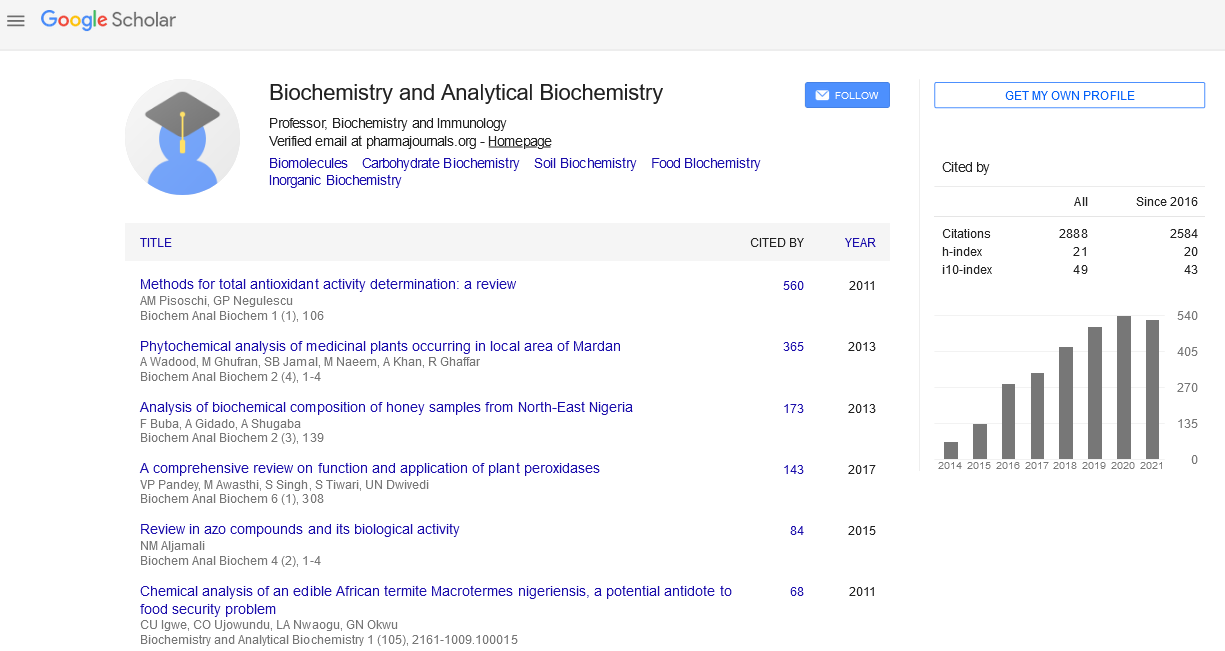Indexed In
- Open J Gate
- Genamics JournalSeek
- ResearchBible
- RefSeek
- Directory of Research Journal Indexing (DRJI)
- Hamdard University
- EBSCO A-Z
- OCLC- WorldCat
- Scholarsteer
- Publons
- MIAR
- Euro Pub
- Google Scholar
Useful Links
Share This Page
Journal Flyer

Open Access Journals
- Agri and Aquaculture
- Biochemistry
- Bioinformatics & Systems Biology
- Business & Management
- Chemistry
- Clinical Sciences
- Engineering
- Food & Nutrition
- General Science
- Genetics & Molecular Biology
- Immunology & Microbiology
- Medical Sciences
- Neuroscience & Psychology
- Nursing & Health Care
- Pharmaceutical Sciences
From discovering calcium paradox to Ca2+/cAMP interaction: Impact in human health and disease
Global Congress on Biochemistry, Glycomics & Amino Acids
December 08-09, 2016 San Antonio, USA
Leandro Bueno Bergantin and Afonso Caricati-Neto
UNIFESP-Escola Paulista de Medicina, Brazil
Scientific Tracks Abstracts: Biochem Anal Biochem
Abstract:
The hypothesis of the so-called �??calcium paradox�?� phenomenon in the sympathetic neurotransmission has its origin in experiments done in models of neurotransmission since 1970´s. Historically, �??calcium paradox�?� originated several clinical studies reporting that acute and chronic administration of L-type Ca2+ Channel Blockers (CCBs), drugs largely used for antihypertensive therapy such as verapamil and nifedipine, produces reduction in peripheral vascular resistance and arterial pressure, associated with a paradoxical sympathetic hyperactivity. Despite this sympathetic hyperactivity has been initially attributed to adjust reflex of arterial pressure, the cellular and molecular mechanisms involved in this paradoxical effect of the L-type CCBs remained unclear for four decades. Also, experimental studies using isolated tissues richly innervated by sympathetic nerves showed that neurogenic responses were completely inhibited by L-type CCBs in high concentrations, but paradoxically potentiated in low concentrations, characterized as a �??calcium paradox�?� phenomenon. We discovered in 2013 that this paradoxical increase in sympathetic activity produced by L-type CCBs is due to Ca2+/cAMP interaction. Then, the pharmacological manipulation of this interaction could represent a potential cardiovascular risk for hypertensive patients due to increase of sympathetic hyperactivity. In contrast, this pharmacological manipulation could be a new therapeutic strategy for increasing neurotransmission in psychiatric disorders such as depression, and producing neuroprotection in the neurodegenerative diseases such as Alzheimer´s and Parkinson�??s diseases.
Biography :
Leandro Bueno Bergantin received his academic education at UNIFESP-EPM (Brazil) and UAM (Spain) i.e., degree in Biomedicine in 2008, MSc in 2010 and PhD in 2014. His research involves cell signaling mediated by Ca2+ and cAMP, skeletal and smooth muscles, peripheral and central nervous systems. His research work solved the enigma of the paradoxical effects produced by L-type Ca2+ channel blockers. He is currently pursuing Post-doctoral fellowship (FAPESP) at UNIFESP-EPM.
Email: leanbio39@yahoo.com.br


